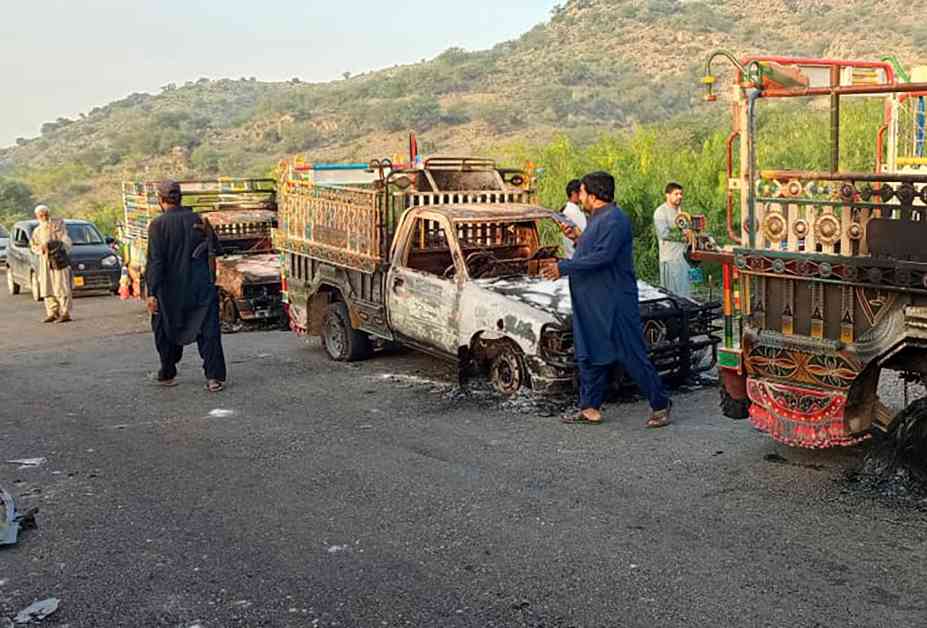Deadly Attacks Leave 38 Dead in Balochistan, Pakistan
The volatile region of Balochistan in southwestern Pakistan was once again rocked by deadly attacks that left 38 people dead. The Balochistan Liberation Army (BLA) has claimed responsibility for at least one of the assaults, adding to the long history of violence and rebellion in the province.
Multiple Attacks Unfold in Balochistan
The series of attacks began with armed men stopping several buses and trucks overnight on Sunday in the remote area of Rarasham in Musakhail district. After checking passengers’ IDs, the gunmen proceeded to shoot 23 people, set 10 vehicles ablaze, and then made a swift escape. This brutal attack left a trail of destruction and loss in its wake, leaving the local community in shock and mourning.
In a separate incident in Qalat district, nine individuals, including four police officers and five passersby, were ruthlessly gunned down by assailants. The violence continued to escalate as a railway track was blown up in Bolan, a police station in Mastung was attacked, and multiple vehicles were set on fire in Gwadar city. The coordinated nature of these attacks points to a well-planned and orchestrated campaign of violence.
The attacks along the highway connecting Balochistan to Punjab came shortly after the BLA issued a warning to stay away from the highways in the province. The group claimed that their fighters targeted military personnel traveling incognito, but the Pakistani Ministry of Interior refuted this claim, asserting that the victims were innocent civilians caught in the crossfire.
Balochistan’s Longstanding Rebellion
Balochistan has been a hotbed of rebellion for years, with various armed groups vying for control and independence from the Pakistani government. Rights groups have condemned Pakistan’s heavy-handed response to the Baloch nationalist movement, citing cases of enforced disappearances and state repression as evidence of the government’s oppressive tactics.
The BLA, one of the prominent separatist groups in the region, has been linked to multiple attacks in Balochistan, targeting civilians and security forces alike. The secessionist aims of these armed groups have led to a cycle of violence and instability in the resource-rich but economically disadvantaged province.
President Asif Ali Zardari and Interior Minister Mohsin Naqvi condemned the attacks in Musakhail as barbaric and vowed to bring the perpetrators to justice. The Punjab provincial government also denounced the assaults and called on the Balochistan provincial government to intensify efforts to combat BLA terrorists. Chief Minister Sarfraz Bugti assured the public that the attackers would be apprehended and held accountable for their actions.
Violence and Instability in Balochistan
The recent spate of attacks in Balochistan underscores the ongoing challenges facing the province, where violence and instability have become all too common. The targeting of civilians and security personnel by armed groups has created a climate of fear and uncertainty, making life precarious for the residents of Balochistan.
The resource-rich province’s strategic location has made it a battleground for competing interests, with various armed groups seeking to assert their control and influence in the region. The government’s heavy-handed tactics have only served to exacerbate tensions and fuel the cycle of violence that plagues Balochistan.
The attacks on innocent civilians and security forces in Balochistan highlight the urgent need for a comprehensive and sustainable solution to the region’s long-standing issues. Addressing the root causes of the conflict, including grievances related to autonomy and resource distribution, is essential to achieving lasting peace and stability in Balochistan.
International Response and Humanitarian Concerns
The international community has expressed concern over the escalating violence in Balochistan and called for a peaceful resolution to the conflict. Human rights organizations have raised alarm over the reported cases of enforced disappearances and extrajudicial killings in the province, urging the Pakistani government to uphold the rule of law and respect human rights.
As the death toll continues to rise and the humanitarian situation deteriorates, there is an urgent need for humanitarian assistance to the affected communities in Balochistan. Providing support to those displaced by the violence and ensuring access to essential services such as healthcare and education are critical steps in alleviating the suffering of the people of Balochistan.
In conclusion, the recent attacks in Balochistan represent a troubling escalation of violence in the region, underscoring the urgent need for a peaceful and sustainable solution to the conflict. Addressing the root causes of the violence, upholding human rights, and promoting dialogue and reconciliation are essential steps towards achieving lasting peace and stability in Balochistan.



























